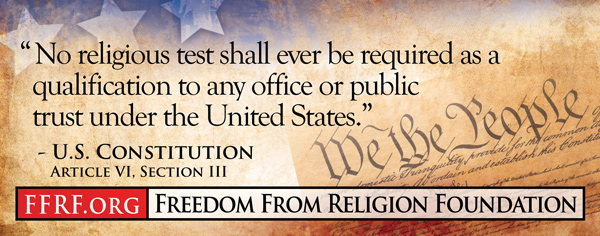
The Freedom From Religion Foundation applauds the quiet, revolutionary policy change by the U.S. House to drop “So help me God” from witness oath-taking. As House Judiciary Committee Chair Jerrold Nadler has refreshingly stated: “We do not have religious tests.”
That is a lesson the U.S. ambassador to Israel needs to be reminded about. On Tuesday, May 13, David M. Friedman, speaking in Jerusalem, disturbingly pronounced: “Israel is on the side of God, and we don’t underestimate that.”
The only oath in our godless Constitution is likewise godless. The presidential oath in Article II does not include the words “So help me God,” rather prescribing as an oath or affirmation these words: “I do solemnly swear (or affirm) that I will faithfully execute the Office of President of the United States, and will to the best of my ability, preserve, protect and defend the Constitution of the United States.” The modern tradition of presidents appending “So help me God” didn’t start until World War I. (Nor is there any mention in the Constitution of placing a presidential hand on a bible.)
“I think God belongs in religious institutions: in temple, in church, in cathedral, in mosque — but not in Congress,” says U.S. Rep. Steve Cohen of Tennessee, the chair of the Judiciary Committee’s Subcommittee on the Constitution, Civil Rights and Civil Liberties. He has accused Republicans of “using God.” Hear, hear.
The New York Times reports that Republican lawmakers are, not surprisingly, trying to circumvent the rule. During a House Natural Resources Committee meeting, Rep. Garret Graves (R-La.) fatuously announced: “I am a sinner, I make mistakes every single day, but I do think that we could use a little more of God, not less.” Rep. Jeff Duncan (R-S.C.) complained during a House Energy and Commerce oversight subcommittee that “the oath was incorrect and incomplete.” In response, Rep. Diana DeGette (D-Co.) firmly told him: “This is the oath we use, and that’s the oath we’re going to use today.”
If the House comes under Republican control again, Republican leaders, of course, can change the rules back. Meanwhile, it is thrilling to see elected officials catching up with the changing demographics, the rise of the “Nones,” and acknowledging secular principles. For far too long “God” has been a “gotcha” issue in Congress, with public officials quick to cave if they fear their piety will come under question.
We’ve come a long way since 2002. That year, members of Congress in both parties raced to stand in lockstep on the steps of the Capitol to recite the Pledge of Allegiance, screaming out the words “UNDER GOD,” to protest of an appeals court ruling against using the religious pledge in schools.
But the administration still has a long way to go. Ambassador Friedman needs to be reminded that claiming endorsement from a deity is a dangerous game that any nation or warmongers can play. The Nazis pronounced God was on their side, inscribing the words “Gott mit uns” on the buckles of soldiers’ belts. President Lincoln famously commented on the piety of both sides in the Civil War. His observation, “Both read the same bible, and pray to the same God,” are inscribed on the walls of the Lincoln Memorial. Friedman’s remarks are offensive, gratuitous and reckless. Not to mention bizarre. Who is he to claim to know who a deity would favor, if there were a deity?
Unlike Friedman, the framers of the U.S. Constitution were first among nations not to claim a pipeline to a divinity. They placed sovereignty in “We, the People,” not a deity. Our secular constitution therefore charges our public officials with taking policy positions for secular reasons, rather than repeating the historic mistake of claiming divine support.
We should learn the lesson our Founders tried to teach more than two centuries ago — to keep religion and government separate. No oath, and no government policy, should ever rely upon a god that only some Americans believe in.

